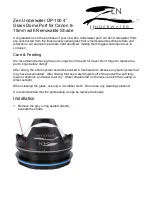
7.10 Operating Hints
General
•
De-limb all tree trunks to make them easier and safer for
handling.
•
If working with a trailer, make sure it is securely attached
to the tow vehicle. This provides required stability when
loading / unloading heavy logs.
•
Stay away from overhead power lines to prevent serious
injury or death from electrocution. Remember, electrocution
can occur without direct contact.
•
Position the trailer as close to the material stack possible.
This will make maneuvering the grapple easier especially
with heavy logs.
Engine Speed
It is recommended that the skid steer engine operate at no less
than 1/4 throttle. LXG Grapples are designed to operate with a
hydraulic flow between 5–10 gpm (19–38 Lpm). LXG430RP
requires 10–20 gpm (38–75 Lpm).
Rough Terrain
The machine can be used in a variety of conditions including
rugged terrain. Try to work on firm, level ground whenever
possible.
•
Reduce speed over rough terrain.
•
If equipped with a winch, release the winch so it can
freespool, then drive the skid steer over the rough area.
Once across, engage the winch and pull the load across.
Working on Slopes
•
Make sure that there are no bystanders on the slope.
•
When skidding, confine your travel to straight up and down
slopes.
•
Do not attempt to travel across steep slopes to avoid a
potential rollover.
•
Travel at safe speeds. Avoid turns on slopes.
Points to Remember
•
Be aware of the swing radius of the logs while carrying
them at right angle or parallel.
•
Plan your skidding path so that it is free of debris and
obstacles.
•
Always pull logs driving the skid steer backwards. Never try
to drive forward with the grapple holding a log.
•
Use a choker chain or winch strap to connect to the winch
rope. Do not use the winch rope to prevent breakage from
abrasion or snagging.
•
While carrying logs, avoid hitting objects with the ends of
the logs.
LXG430RP Models
•
Refrain from skidding or carrying a load with the boom
extended.
•
Never winch at an angle greater than 25° from the
centerline of the skid steer. Never winch across a slope.
7.11 Traveling
(No load in the grapple.)
• Make sure that the grapple is securely attached to the
skid steer, and that the latch arm and pins are secure
before transporting.
• Turn into curves or go up or down hills only at a low
speed and at a gradual steering angle. Slow down on
rough or uneven surfaces.
• A heavy load can cause instability of the skid steer. Use
extreme care during travel. Slow down on turns and
watch out for bumps.
• Never allow riders on the skid steer or grapple.
1.
Be sure all bystanders are clear of the machine.
2.
Check the machine is securely attached to the skid steer
and all retainer pins are installed.
3.
Close the forks. Be aware of grapple head swing. Tie off
grapple head for extended road travel or driving over rough
terrain.
4.
Attach a slow moving vehicle sign at the back of the skid
steer. Check skid steer lights function properly.
5.
Be sure you follow all applicable lighting and marking
regulations when transporting. Check with your local
authorities.
6.
Be sure your machine can clearly be seen by overtaking
and oncoming traffic.
7.
Keep to the right and yield the right-of-way to allow faster
traffic to pass. Drive on the road shoulder if permitted by
law.
8.
Always use hazard flashers on the skid steer when
transporting unless prohibited by law.
9.
LXG430RP models—make sure Boom Extender is
retracted.
LXG400 Series
Log Grapples
Operating Instructions
39














































